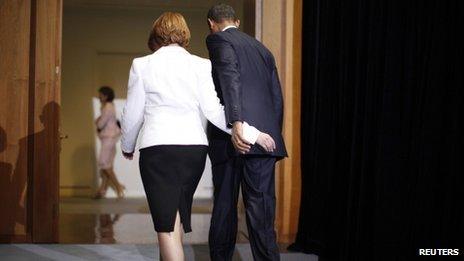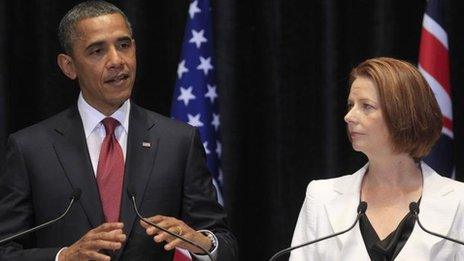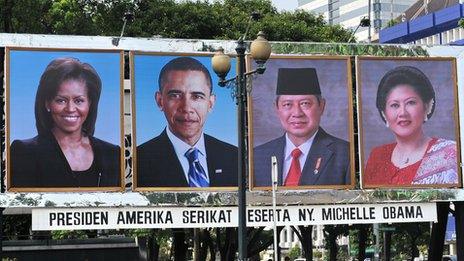The Pacific President
- Published
- comments

President Obama (right with Australian Prime Minister Julia Gillard) says the Asia-Pacific region will be a critical factor in America's economic recovery
US President Barack Obama's announcement that he is going to send 2,500 Marines to Australia and increase visits of ships, submarines and aircraft to the country is of real significance.
One observer calls it a cold and clever, external move.
Politicians tend to tell every region and country they visit how important they are.
When President Obama says: "The United States of America has no stronger ally than Australia," you might want to remember that he said it about France, external at the beginning of the year.
But when he says to Australians: "We are two Pacific nations," it is from the heart.
When he declares, external: "The Asia-Pacific region is absolutely critical to America's economic growth," and ''We're here to stay. This is a region of huge strategic importance to us,'' you can believe he means it, external.
Sending the troops annoys China, which as it grows in economic power is becoming a lot more interested in being the boss of its own backyard.
There have been pretty tense confrontations over who owns what bit of the South China Sea and China's "blue-water strategy" - making its presence felt, external throughout the Pacific Ocean - worries some.
The Chinese say, external of President Obama's move: "It may not be quite appropriate to intensify and expand military alliances and may not be in the interest of countries within this region."
It is part of a bigger picture.
They are also not keen on a new military pact, external Secretary of State Hillary Clinton has signed with the Philippines, bolstering its navy.
They dislike even more President Obama's plan to raise territorial disputes over the South China Sea at a meeting of the Association of South East Asian Nations, external this weekend.
China wants the disagreements sorted out through negotiations between individual countries. The US wants a grander multi-nation agreement.
But sending the Marines to Australia is not about any crude confrontation on the high seas.
It is about America signalling to its allies in the region that it is in this for the long haul.
There are plenty of countries in the region who eye China with suspicion and will welcome help from America with a lot more enthusiasm than Afghans or Iraqis.
The US Marines are not likely to end up intervening in a confrontation between a Japanese fishing boat and a Chinese destroyer.
But as the century progresses, they or their heirs could well find themselves dealing with a humanitarian crisis as Bangladesh disappears under water, helping as refugees from Burma flood into Thailand or mitigating the chaos of the reunification of Korea.
Born on America's Pacific Islands, raised for a time in Indonesia, President Obama is of course more likely be a Pacific President than the transtlanticists of the past, whose ancestors came from Europe, the continent which once defined and dominated the whole world.
But it is not about sentiment. Foreign policy is usually linked to economic interest and President Obama makes this explicit.
If he is confronting China it is because that is the inevitable consequence of being a power in the region.
He says: "The economy in this area is going to be the engine for world economic growth for some time to come. The lines of commerce and trade are constantly expanding.
"And it's appropriate then for us to make sure that not only our alliance but the security architecture of the region is updated for the 21st century, and this initiative is going to allow us to do that."
President Obama thinks he sees the big picture and where America's long-term interests lie. The Pacific region gives him a chance to practise his doctrine of leadership through alliances.
But it is also a region with some big, tough and seemingly intractable problems.
What sort of leadership America provides and with what aims will be a critical question not only for him but presidents to come.
- Published16 November 2011

- Published11 November 2011

- Published18 August 2011